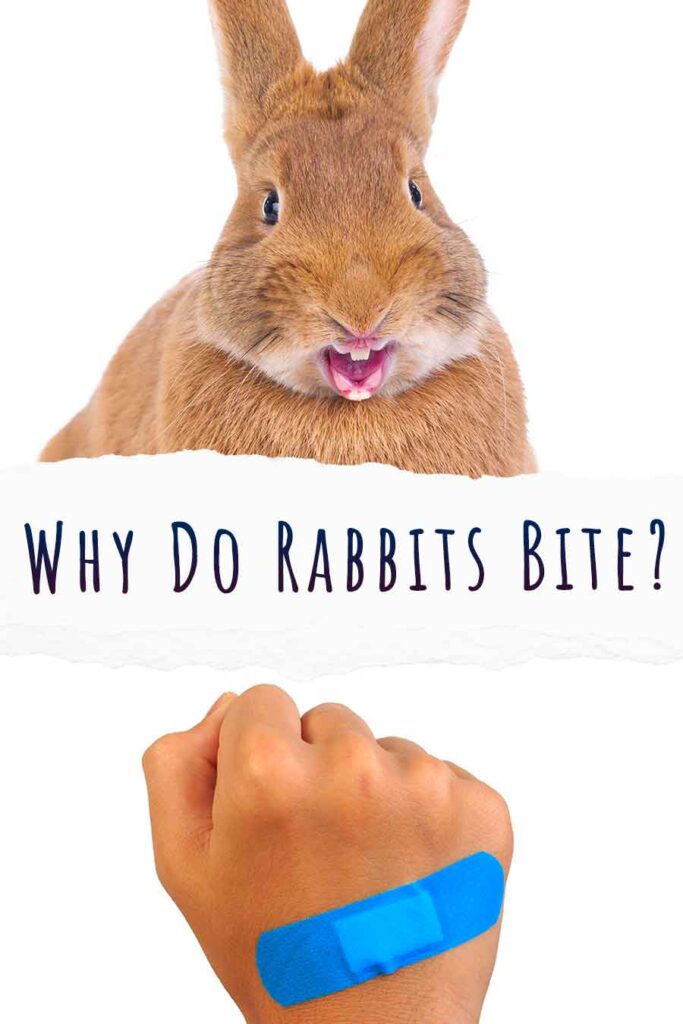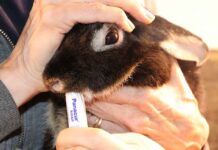In this detailed guide to why rabbits bite, we take a look at the reasons why bunnies appear to attack their hutch, your home, each other, and even you. And we’ll aim to answer the question “why is my rabbit biting me all of a sudden?”
Rabbits may bite for one of several reasons, none of which have anything to do with being deliberately naughty, or wishing to upset you. Since rabbits who resort to biting are usually also very stressed, finding a solution will make both of you happier in the long run.
Do bunnies bite?
Bunnies are best known for being cute and fluffy prey, not toothy predators. But nonetheless, as some bunny owners can tell you, it is possible to end up on the wrong end of a rabbit bite. Alternatively, you might be struggling with a bunny who bites at your furniture, their rabbit companions or even their own fur. These are all recognized rabbit behaviors, and we’re here to help you tackle them.

Why do rabbits bite?
Rabbits may engage in biting behavior for a number of reasons. Let’s sort them out by target, and look at what motivates it.
Let’s start with the rabbits who’s biting seems to be mostly directed at themselves…
Why do rabbits bite their fur off?
Biting their fur off, known as barbering, is a common behavioral problem in rabbits. It can be brought on by
- stress
- insufficient fiber in their diet
- pregnancy (to make a nest)
- and infestation by external parasites, such as mites.
Occasionally rabbits bite the fur off other bunnies that they live with too. This is usually a result of friendly social grooming gone too far, which can happen due to stress, boredom, or lack of dietary fiber. Rabbits can usually be discouraged from biting the fur off themselves or each other by improving their diet and providing more space and things to do, such as puzzle feeders to solve.
Why do rabbits bite each other?
Sometimes rabbits bite more than just each other’s fur. Young rabbits, called kittens, frequently nip each other as part of play fighting. Before they reach sexual maturity, this is a harmless way of pracising the behaviors they’ll use in later life to defend their territory. As adults, rabbits in the same social group might still deliver playful nips to one another as part of a sociable rapport to maintain their bond.
As they get older, some biting is still a normal part of rabbit play in a bonded social group. It’s also one way in which rabbits establish a social hierarchy. But sometimes it can escalate into dangerous levels of aggression. Bunny attacks tend to be intrasexual, which means females are most likely to fight other females (over space and food for rearing babies), and males are most likely to fight other males (for territory and access to females). Being related doesn’t rule out the possibility of rabbits fighting either. Once they have reached sexual maturity, rabbits are just as likely to fall out with same sex siblings.
Solving hostile bunny behavior
Making sure your bunny family has plenty of space, including lots of hiding places filled with hay, is a good strategy to avoid them falling out over access to resources. Since rabbits are especially territorial around resources they need in order to reproduce, getting both males and females neutered can also help. Unfortunately though, bunnies have long memories and bear a grudge, so fixing the environment or even neutering them after hostilities have begun may not be enough to restore harmony. Quite often, separating them to prevent an aggressive rabbit seriously injuring a more submissive rabbit is the only solution.
Why do rabbits bite everything at home?
We’ve looked at rabbits biting each other, but what about a solitary house rabbit hell bent on biting everything at their mouth level? Many a house rabbit has a guilty tale in their past about chewing the furniture legs, or leaving bite marks in the sofa. The truth is, they are among nature’s great chewers. Rabbit’s teeth grow continuously throughout their lives, and chewing is vital to wear them down. Without sufficient things to chew on (including plentiful hay in their diet) their teeth can grow overly long and need veterinary intervention.
The best way to manage a rabbit biting everything in your house is to provide lots of hay and toys which they can bite, and redirect them to these. Bored rabbits might also look for more chewing opportunities simply to occupy themselves and pass the time. Offering things like puzzle feeders, or hiding their food amongst their bedding and toys are fun ways to prevent bunny boredom.
Why do rabbits bite people?
There are many reasons why a rabbit might react aggressively towards people and try to bite them, including:
- Pain or physical discomfort.
- Lack of human interaction in the past, and especially as a young kitten.
- Inappropriate handling.
- Hormonal influence, for example during or pregnancy or nursing.
- Learned response, because they have been mistreated or had a negative experience around people in the past.
- Anxiety response.
- Redirected behavior, because they’re stressed about something else.
- Territoriality.
In all of these situations, the bunny is stressed because they expect human contact to hurt them, harm them, or take away something they need. It’s never to do with being mean, spiteful, or naughty.
Why does my rabbit bite me?
Most rabbits only bite as a last resort. When it comes to fight or flight, most will attempt to get away first. They are much better adapted for running than fighting, and of course they will have noticed that you’re much bigger than them! So, they will only bite you once they’re backed into a corner and out of other options.
In extreme cases of fear-induced aggression, some rabbits charge at humans and bite them in an attempt to frighten them off. If the person (understandably) backs off as a result, charging and biting can turn into a learned, repetitive behavior, because experience has taught them that it works.
If your previously placid rabbit has started biting you all of a sudden, get a vet to examine them for possible sources of pain. Then observe their social behavior and environment for things which could be causing them stress. Never punish an aggressive rabbit for its behavior. They are acting out of fear, and punishment is only going to make the problem worse.
Avoiding bunny bites
The best way to avoid a rabbit attack is to socialize your bunny to being handled regularly from a young age. Baby rabbits who are handled gently on a daily basis between 1 and 6 weeks old tend to not be alarmed by it when they are grown up. However, once this key developmental stage has passed, it can take much longer to acclimatize a bunny to being handled in future.
If you’ve adopted an older rabbit who isn’t used to being held, you can still desensitize them to handling by teaching them to associate it with positive feelings. Namely, the feelings they get from a delicious snack! Behaviorists typically recommend spending at least four weeks not trying to touch them at all, but just feeding them tiny pieces of apple, carrot or banana several times a day. Once they associate you with the delivery of food, it’s likely they’ll start approaching you when you arrive and eating confidently from your hand. Then you can start gently stroking them once or twice, and eventually picking them up.
During this process, if your rabbit has already bitten you in the past then protect yourself with tough gardening gloves and a long sleeved jacket when you clean out their hutch or change their food and water. This means you won’t have to beat a retreat if they try to bite you again. So they won’t learn that biting works.
Another important way of avoiding being bitten is learning to recognize bunny body language, and knowing when not to try and touch them or intrude on their space, even if you usually have a good relationship.
Interpreting bunny body language
Rabbits who don’t want you to get any closer may:
- crouch low
- hunch their body
- freeze
- flatten their ears
- try to run away
If your new rabbit behaves like this, give them space and use the technique above to show them that you’re friend, not foe.
How to play with a bunny safely
Handling your rabbit appropriately and playing with them in a safe way is vital for avoiding bites. In particular, it’s important to pick them up correctly. Being held off the ground is very disorientating for them, so always support their butt, and hold them firmly against your body. Young children shouldn’t carry rabbits around in case they accidentally drop them. The best way to play with your rabbit is at ground level, by gently rolling balls to them, offering them small stuffed toys to play with and even using training games.
Why do bunnies bite – Summary
Bunnies resort to biting for a number of reasons, but never out of spite. A biting rabbit is usually a very scared rabbit, and working out what they’re worried about is the key to stopping the behavior.
Have you had to overcome aggressive rabbit behavior before? Why not share your story with our other readers in the comments box down below. You never know who it might help out!
More resources for better understanding your bunny
If you’d like to know more about barbering and why rabbits bite their fur off, visit us here.
- Check out our bunny noise guide to rabbit growling and other sounds.
- For more advice on destructive rabbit chewing inside the home, go here.
- And for a rabbit chewing their hutch, visit us here.
- Is your rabbit grunting? This article can explain why!
References
Burn & Shields. Do rabbits need each other? Effects of single versus paired housing on rabbit body temperature and behaviour in a UK shelter. Animal Welfare. 2020.
Cromwell-Davis. Behavior Problems in Pet Rabbits. Journal of Exotic Pet Medicine. 2007.
Cromwell-Davis. Rabbit Behavior. Veterinary Clinics: Exotic Animal Practice. 2021.
Guen. Managing conspecific overgrooming in rabbits. The Veterinary Record. 2016.
Magnus. Behaviour of the pet rabbit: what is normal and why do problems develop? In Practice. 2005.
Pilny. Small Exotic Companion Mammal Wellness Management and Environmental Enrichment. Veterinary Clinics: Exotic Animal Practice. 2015.
Rommers et al. Effect of hiding places, straw and territory on aggression in group-housed rabbit does. Applied Animal Behavior Science. 2014.
Valuska & Mensch. Size does matter: The effect of enclosure size on aggression and affiliation between female New Zealand White rabbits during mixing. Applied Animal Behavior Science. 2013.















One more reason a rabbit may bite is for a male to bite firmly the knap of the neck of a female to hold her while having sex. I kept a young male for a short time that tried to do that with my hand.
Another rabbit that I have had for 2 years prefers to chew soft insulation off of finely stranded wire. Certainly not something that wears down the teeth!